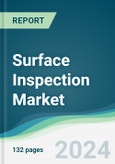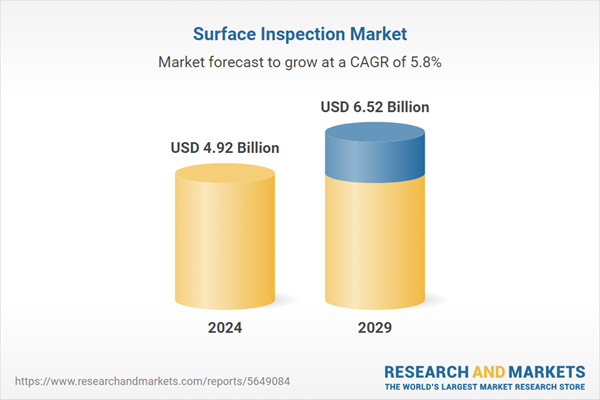Surface inspection is the process of surface examination to find potential defects, flaws, or irregularities. It ensures a long service life for a product or commodity and uses directional lighting, smart cameras, software, and equipment to detect and correct surface defects. Such technology is usually used in the automotive industry to detect body or paint defects, and it also finds applicability in the electronics segment to correct surface defects.
The global surface inspection market is expected to grow steadily, mainly due to the increasing relevance of the automotive sector. Moreover, the stricter government regulations implemented in the automotive and healthcare industries are expected to drive up the market demand for surface inspection. The North American region is anticipated to hold a considerable market share due to the increasing advancements in automotive technology and the booming electronics industry.
Surface Inspection Market Drivers
Growing applicability in road infrastructure inspection has positively impacted the market growth.
The increasing prevalence of road potholes can damage and create various issues on a vehicle, such as buckling wheels, cracks on the body, tire lumps, fractured alloys, suspension issues, tracking and wheel balancing issues, and many more. According to the American Automobile Association, the average pothole-related repair cost is US$406. Likewise, as per CAA-Quebec's April 2023 press release, the damage expense due to potholes ranges between $200 to $600 in Quebec, which has witnessed a significant 20% growth from 2020’s average cots. Such issues have raised concern regarding road surface inspection, enabling companies to develop inspections to cater to such needs.Technological innovations such as Chromasens's release of the 3DPIXA RI stereo line-scan camera have made road surface inspection easy and efficient. When fitted on a typical vehicle, it can acquire high-resolution inline photographs of continuous road surfaces as broad as 14.4 feet in one pass. It can identify not only the width but also the depth of a pothole by creating a 3D model with a point cloud of the hole.
The technology would be significantly beneficial since manual road surface inspection is expensive and time-consuming. It requires professional workers to visually detect and record the location and severity of potholes and cracks and then report them to the maintenance department to fix them.
Bolstering growth in the automotive sector has accelerated the overall market growth.
Surface inspection is used in the automotive sector to diagnose and repair paint and surface cracks or defects. The demand for new automobiles is expected to increase with the increasing developments in the automotive sector and the expanding adoption of electric vehicles. According to the International Organization of Motor Vehicle Manufacturers, worldwide vehicle sales in 2023 stood at 92.72 million, comprising over 65.27 million passenger vehicles. Owing to the advancements in the automotive industry, the surface inspection demand is also expected to increase.Major automotive manufacturers such as BMW and Toyota are investing to improve their vehicle models' production scale and quality. For instance, in October 2022, DeGould installed its digital vehicle inspection system, “Auto-Compact”, at Toyota Motor Manufacturing Mississippi. The inspection system sets a benchmark for inspection metrics and improves the overall accuracy of the damage detection process. The installation would bolster Toyota’s “12th Generation Corolla” manufacturing process.
Likewise, in March 2022, the BMW Group started using automated surface processing in its Regensburg manufacturing facility to inspect, mark, and analyze the painted vehicle surface in series production.
Surface Inspection Market Geographical Outlook
North America is expected to grow at a significant rate.
North America is predicted to constitute a considerable share of the market fuelled by the booming automotive and medical device manufacturing in nations, namely the United States and Canada. This has bolstered the market demand for surface inspection in such nations. According to the data provided by the International Organization of Motor Vehicle Manufacturers, in 2023, USA automotive production reached 10.61 million units, signifying a 5.6% increase over 2022’s production. Likewise, Canada and Mexico experienced significant growth of 26% and 13% compared to the previous year.Surface Inspection Market Key Developments
- March 2024: Hitachi Hi-Tech Corporation launched the “LS9300AD” wafer surface inspection system equipped with dark-filed laser scattering detection and DIC (Differential Interference Contrast) function. The new surface inspection system would enable wafer manufacturers to inspect the front & back of non-patterned wafer surfaces.
- January 2024: HACARUS Corporation formed a collaboration with Mitsubishi Electric Corporation to develop an AI-based visual inspection system. This system will leverage Mitsubishi’s FA products and knowledge with HACARUS’s AI technology and will primarily focus on surface inspection in the manufacturing sector.
- September 2023: Printum Technology launched its fully automated “PEM Inspection & Cutting System”, equipped with a high-resolution inspection camera, web tension control, and low-friction swivel castors. The new system, owing to its unique functions, has set standards for material testing and high-precision surface inspection in major applications such as battery and automotive manufacturing.
- July 2023: Hexagon launched “Absolute Scanner AS1-XL”, a 3D laser scanner designed for large surface inspection. The product is based on SHINE technology, which allows it to boast ultra-wide scanning, making it ideal for deep cavity inspection on large surfaces such as large automotive castings, marine propellers, and aerospace panels.
The Surface Inspection market is segmented and analyzed as:
By Component
- Camera
- Optics
- Processor
- Software
- Others
By Surface Type
- 2D
- 3D
By End-User Industry
- Automotive
- Consumer Electronics
- Healthcare
- Travel and Transport/Logistics
- Others
By Geography
- North America
- USA
- Canada
- Mexico
- South America
- Brazil
- Argentina
- Others
- Europe
- Germany
- France
- United Kingdom
- Spain
- Others
- Middle East and Africa
- Saudi Arabia
- Israel
- South Africa
- Others
- Asia Pacific
- China
- Japan
- South Korea
- India
- Others
Table of Contents
Companies Mentioned
- Baumer Inspection
- Isra Vision
- AMETEK
- Omron Corporation
- Cognex Corporation
- Edmund Optics
- Matrox Imaging
- Teledyne Technologies
- Keyence Corporation
Table Information
| Report Attribute | Details |
|---|---|
| No. of Pages | 132 |
| Published | July 2024 |
| Forecast Period | 2024 - 2029 |
| Estimated Market Value ( USD | $ 4.92 Billion |
| Forecasted Market Value ( USD | $ 6.52 Billion |
| Compound Annual Growth Rate | 5.7% |
| Regions Covered | Global |
| No. of Companies Mentioned | 9 |









